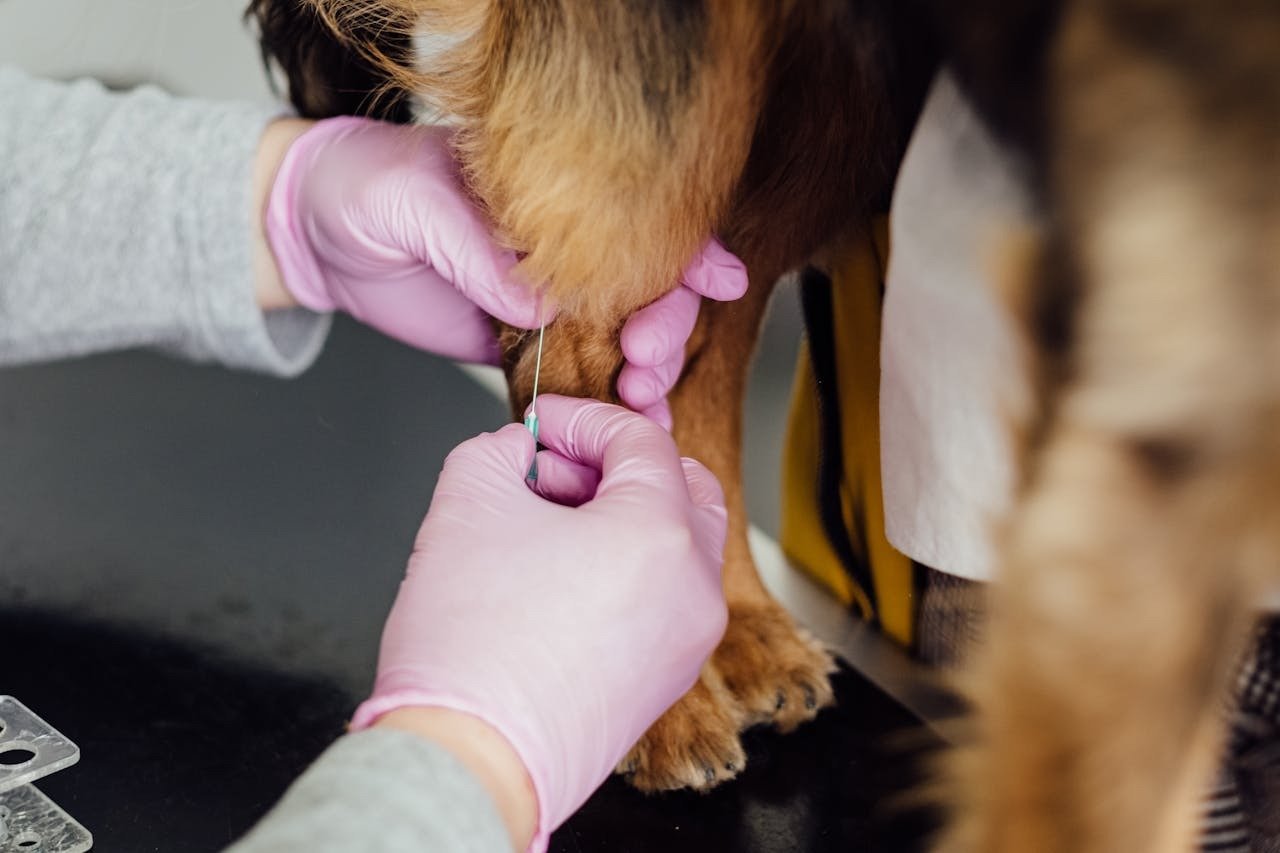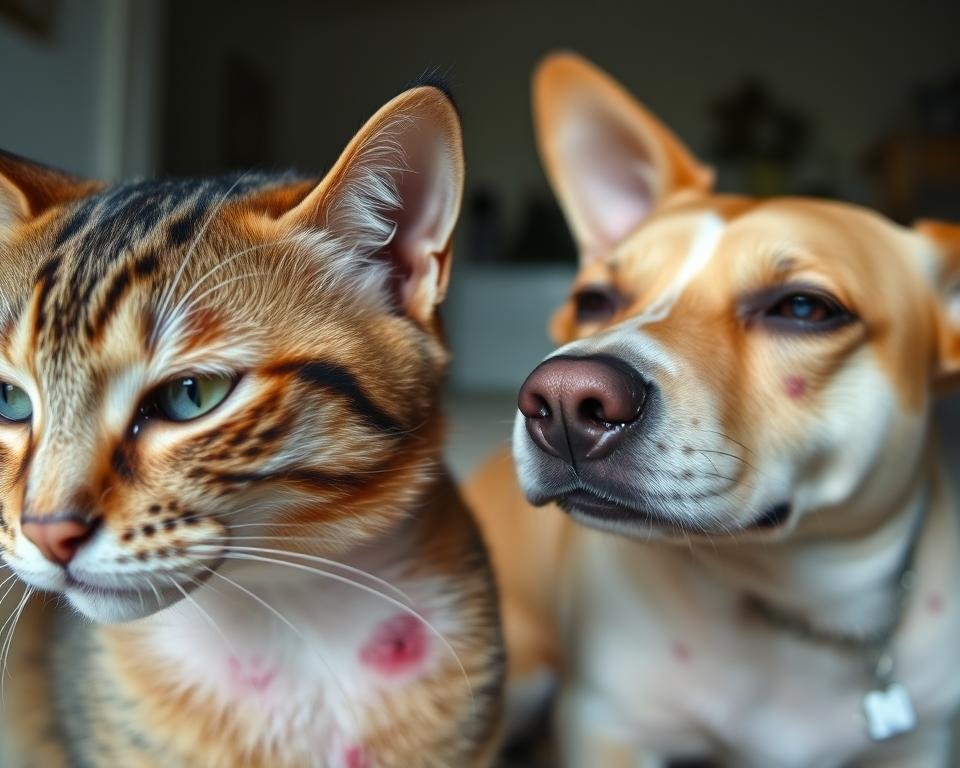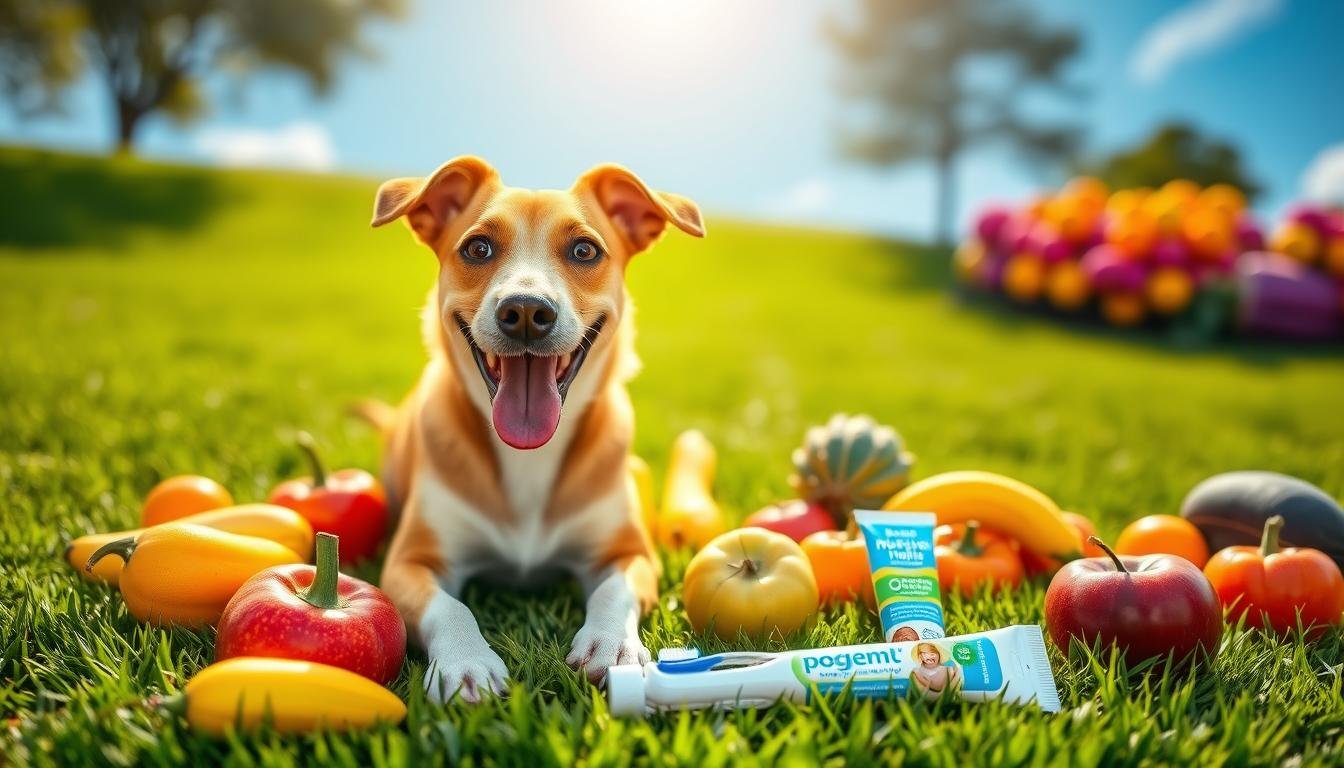As a new puppy parent, watching your furry friend go outside for the first time is thrilling. But, it’s important to know when they can go and how to keep them safe. Puppies need to be vaccinated before going outside. This is because they are most vulnerable to diseases between 3-12 weeks old.
Puppies usually get their full vaccinations by 18 weeks. They need to get the DAPP and Rabies vaccines every three weeks until they are 16-20 weeks old. It’s okay for them to play in their own backyard if no sick animals have been there in a year. But, they should avoid public places until they are fully vaccinated to stay safe from diseases.
By following the right vaccination schedule and safety rules, your puppy’s outdoor fun can be both safe and enjoyable. The secret to a happy and healthy puppy is finding the right balance between socializing and keeping them safe from diseases in those early months.
Understanding Puppy Vaccination Timeline
Keeping your new puppy safe and healthy is very important. A key part of that is making sure they get the right vaccinations on time. The puppy shot series usually starts when they are 6–8 weeks old. They need new vaccines and boosters every 3–4 weeks until they are 16–17 weeks old.
Some puppies might need an extra booster around 20 weeks old. This is more common in breeds like Rottweilers or Doberman Pinschers. They are at a higher risk of parvovirus.
Core Vaccines and Their Schedule
The core vaccines for puppies protect against Parvovirus, Canine Distemper Virus, Canine Infectious Hepatitis, and Rabies. They are given as a combination DAPP vaccine. These shots are vital for building your puppy’s immune system and keeping them safe from serious diseases.
Non-Core Vaccines Based on Lifestyle
Your vet might also suggest non-core vaccines based on your puppy’s lifestyle and where you live. These could include protection against Leptospirosis, Lyme disease, Influenza, Kennel Cough, and Parainfluenza. Talking to your vet about your puppy’s needs will help figure out the best rabies vaccine and puppy shots schedule.
When Vaccines Become Effective
Most vaccines take about two weeks to work fully, except for the Rabies vaccine, which takes 28 days. So, you’ll need to keep your puppy safe and away from sickness until they are fully vaccinated. This is usually around 16 weeks of age.
When Can Puppies Go Outside: Essential Safety Guidelines
Bringing a new puppy home is thrilling, but safety first is key. Puppies can go outside as early as 8 weeks. It’s vital to follow important safety tips to keep them healthy.
First, consider your puppy’s vaccinations. They usually get their first shots at 6-8 weeks. This protects them from serious diseases. Wait at least 7 days after their first shots before taking them outside. Also, avoid public places and unknown dogs until they’re fully vaccinated.
For puppy outdoor safety, start with short, safe trips to your backyard. This helps them get used to new things. It also lowers the risk of getting sick or picking up parasites.
“Puppies are in a critical developmental phase that requires balanced attention to health, safety, and socialization.”
Carrying your puppy to places like vet clinics or groomers helps keep them safe. Also, use paved areas for potty training to avoid parasites.
It’s important to find a balance between puppy outdoor safety and socialization. With careful planning, your puppy can safely explore and grow into a confident friend.
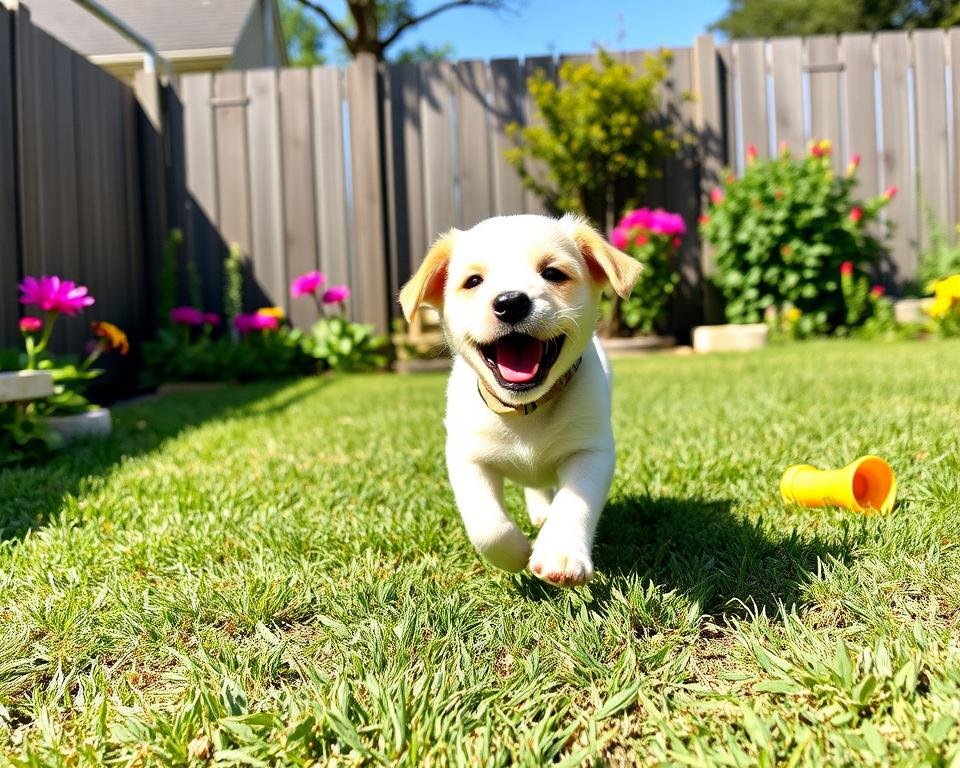
Exploring Your Backyard: First Safe Steps
As your puppy grows, exploring the outdoors can be thrilling. But, it’s key to make sure they’re safe first. Setting up a backyard safety for puppies is the first step to a controlled outdoor environment for them.
Creating a Safe Outdoor Environment
A fenced-in backyard is perfect for your puppy’s first outdoor steps, if it’s clean. Check the area for dangers like sharp objects, toxic plants, or small holes. A safe backyard safety for puppies lets your pup explore freely while staying safe.
Controlled Introduction to Nature
Introducing your puppy to the outdoors should be done slowly. Watch them closely to avoid them eating harmful things or meeting wild animals. This controlled outdoor environment helps your puppy get used to new things while you watch over them. It’s also a great time to start potty training and teach them to play safely.
“The key to a successful outdoor experience for your puppy is creating a safe and controlled environment. By taking the time to prepare your backyard and monitor their exploration, you can ensure your furry friend’s wellbeing and their positive introduction to the natural world.”
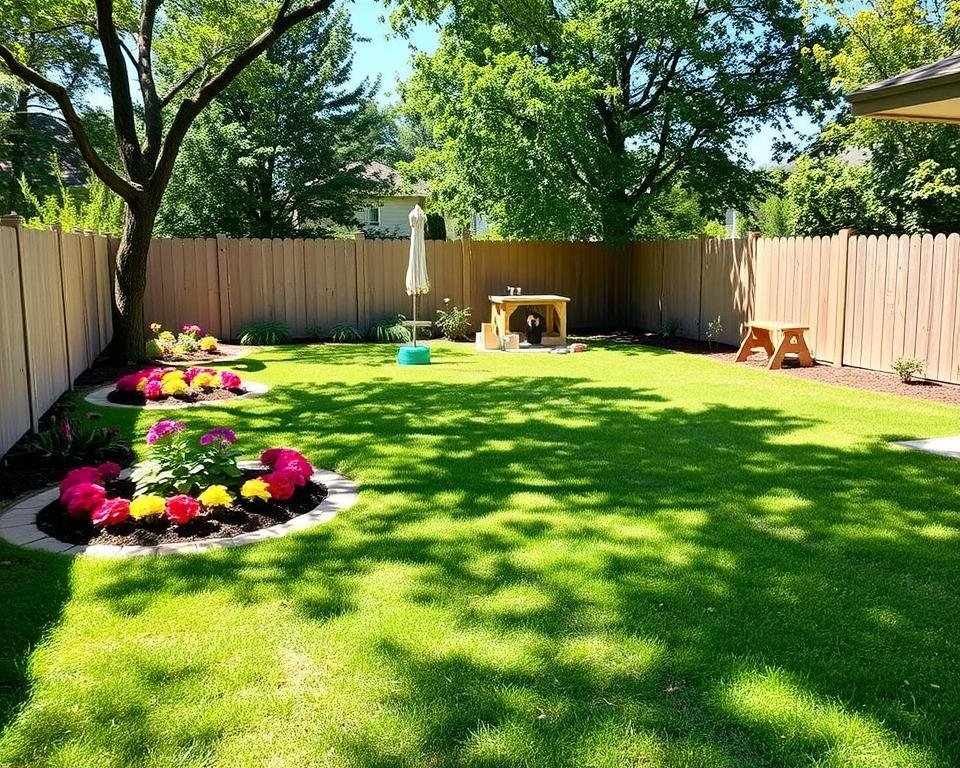
Public Spaces and Walking Restrictions
As a responsible puppy parent, keeping your furry friend safe is key. This is true when it comes to puppy walks and public areas for puppies. Most vets say to keep puppies indoors until they’re fully vaccinated, usually by 14 to 16 weeks. This helps avoid diseases like parvovirus, which can cause vomiting and diarrhea.
Carrying your puppy in public places is best until they’re fully vaccinated. Once they hit the 14- to 16-week mark, start them on short walks in your neighborhood. Focus on leash training and making sure they have positive experiences. As they get more confident, you can make these walks longer.
“Socializing puppies with other dogs should be done carefully, preferably with known dogs with good health and vaccination statuses, until the puppy is fully vaccinated.”
Puppy preschools that use positive reinforcement are also a good option. They help socialize your pup safely. Early experiences before 16 weeks are very important for a dog’s future behavior and development. So, it’s important to find the right balance between letting them explore and keeping them safe.
By following these tips and working with your vet, you can give your puppy a healthy and happy start. This will be true whether they’re indoors or out.
Early Socialization: Finding the Right Balance
Puppy socialization is key to your pup’s growth. It helps them become a well-adjusted adult dog. The first 12 weeks are very important, as the American Veterinary Society of Animal Behavior says. Behavioral problems are a big reason for early death in pups.
To raise a confident and adaptable dog, finding the right balance is essential. This balance is between puppy socialization and keeping them safe.
Safe Indoor Socialization Methods
Start socializing your puppy before they’re fully vaccinated. Introduce them to different sights, sounds, and gentle touch at home. This helps them get used to new things and builds a strong base for future interactions.
Controlled Outdoor Experiences
After their second vaccinations, you can take your pup outside. Invite healthy, vaccinated dogs to your backyard or home. This lets them have safe puppy interactions. Slowly introducing them to new things helps them become confident and well-rounded.
Puppy Classes and Training
Putting your puppy in a training program is a great idea. Puppy school provides a safe environment for puppy socialization. They get to meet other vaccinated pups and learn from experienced trainers. This consistent exposure helps build a confident puppy, and professional trainers can tailor it to your pup’s needs.
“Safely socializing puppies before vaccinations can help them grow into confident, well-rounded adult dogs.”
Remember, socializing puppies should be done gradually and at their own pace. By balancing safe indoor and outdoor experiences, you prepare your pup for a lifetime of positive interactions and adaptability.
Health Risks and Disease Prevention
It’s important to know about puppy diseases and outdoor health risks to keep your pet safe. Unvaccinated puppies are at high risk for serious illnesses like distemper and parvovirus. These diseases can spread quickly through contact with infected animals or dirty places.
To protect your puppy, follow your vet’s vaccination plan carefully. Don’t take them to risky places until they’re fully vaccinated. Also, keep them away from other animals you don’t know. Clean up after your puppy to avoid diseases.
“Protecting your puppy from harmful diseases is a top priority. By following your vet’s advice and taking precautions, you can help keep your furry friend safe and healthy.”
Stay ahead and informed to make sure your puppy’s outdoor adventures are fun and safe. A bit of prevention can keep your puppy happy and healthy.
Can I Take My Puppy Out After First Vaccination
To ensure a smooth transition outdoors once your puppy is fully vaccinated, consider beginning with brief, controlled outings where they can experience new sights and sounds without the risk. This gradual introduction will help them feel more comfortable and confident in various environments. Remember, patience is key in ensuring your puppy remains healthy, so make sure you follow your vet’s advice about when can a puppy go outside safely.
While waiting for your puppy’s full vaccination, you can start introducing them to the outdoors safely. Carrying your puppy in a basket or bag lets them enjoy the sights and smells outside. This helps them get used to their surroundings and socialize without health risks.
Carrying Your Puppy Outdoors
Until your puppy is fully vaccinated, it’s important to keep them off the ground. Carrying them in a secure container helps them explore safely. This way, they can enjoy the outdoors without getting sick from diseases like parvovirus or distemper.
Protected Play Areas
Creating a safe play area in your backyard is another great option. Use a puppy playpen to keep them safe from harmful surfaces or animals. This lets your puppy play and explore while keeping them healthy during the pre-vaccination period.
Early socialization is key, but safety comes first. With these strategies, you can give your puppy the benefits of outdoor fun while keeping them safe.
Conclusion
Introducing puppies to the outdoors needs careful balance. Safety and socialization are key. Follow a proper vaccination schedule and use caution in public. Gradually expose your puppy to new experiences.
As a responsible pet owner, get advice from your vet. They know what’s best for your puppy based on their health and local risks. With the right steps, you can safely introduce your puppy to the world. This will help them grow into happy, well-adjusted dogs.
The socialization period in the first 16 weeks is vital. Gradually introduce them to new sights, sounds, and places. This builds their confidence and prepares them for a lifetime of positive interactions.
With patience, care, and your vet’s guidance, you can enjoy the journey of introducing your puppy to the outdoors.

